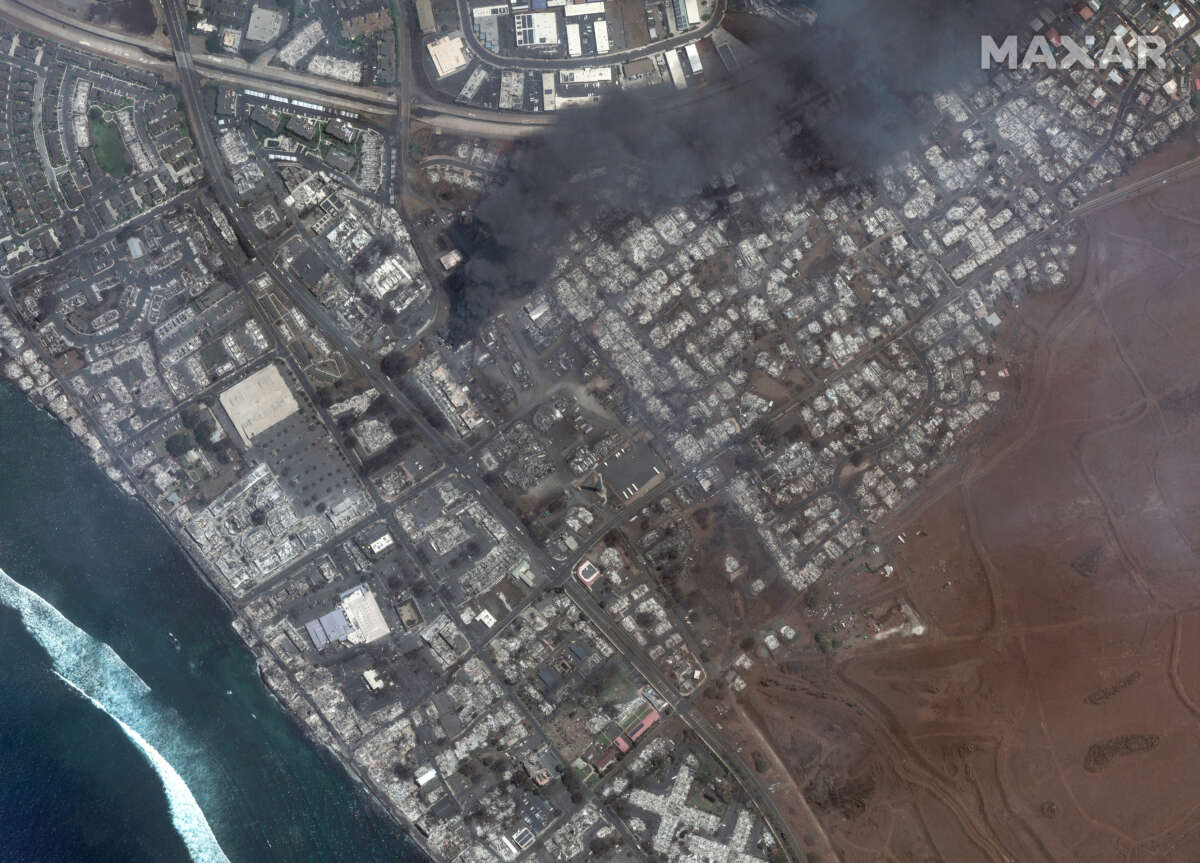At least 36 people have been killed by wildfires on the Hawaiian island of Maui — a disaster that experts say was exacerbated by the climate crisis.
Maui County Mayor Richard Bissen announced the death toll during a press conference on Wednesday, with other officials noting that several hotels and convention centers near the tourist city of Lahaina have opened to assist with evacuation efforts in the area.
Three active fires remain on the island as of late Wednesday night. The Federal Emergency Management Agency (FEMA) approved the state’s request for a disaster declaration, and dozens of U.S. Army members were set to conduct more search and rescue operations on Thursday morning.
Aerial and on-the-ground footage shared on social media showcases just part of the devastation wrought by the wildfires, particularly in the city of Lahaina, once the capital of the Kingdom of Hawaii. One video, taken from inside a helicopter over Lahaina, shows smoke filling the skies and catastrophic damage to the city and nearby wildlife.
The destruction in the historic city is particularly devastating to Native Hawaiians, noted David Aiona Chang, a Native Hawaiian and history professor at the University of Minnesota.
“Many of the disasters that hit Hawaii hit Native Hawaiians the hardest. It’s something that we are going to be dealing with for a long time,” Chang told NBC News.
Kaniela Ing, who grew up in Hawaii and founded the Native-based organization Our Hawaii, lamented the disproportionate impact the damage will have on Native Hawaiians and people of color.
“People hit first and worse by the climate crisis tend to be Black, Indigenous and low income. Yet we’re the keepers of the knowledge of how to build a society that wouldn’t cause ecological collapse and societal doom,” Ing said.
As a result of the fires, thousands of residents on the island have lost power. Officials have issued multiple evacuation orders in response to the disaster, prompting some residents to flee the island entirely.
The current death toll places the Maui wildfires amongst the deadliest in U.S. history. The wildfires are more deadly than the second-worst wildfire event in California’s history, for example.
The direct cause of the wildfires is yet unknown, but scientists say the fires have been exacerbated by high winds in the area, low humidity levels and drought conditions on the island. Earlier this week, wind gusts of up to 80 miles per hour fanned the flames, with one fire that was believed to be contained on Tuesday flaring up because of the winds, officials said.
Climate and forestry experts have noted that the climate crisis likely contributed to the conditions that made the fires so deadly.
Climate change is “leading to these unpredictable or unforeseen combinations that we’re seeing right now and that are fueling this extreme fire weather,” Kelsey Copes-Gerbitz, a researcher at the University of British Columbia’s faculty of forestry, told The Associated Press.
Even Hawaii’s tropical climate wasn’t enough to limit the spread of fires, experts added.
“Climate change in many parts of the world is increasing vegetation dryness, in large part because temperatures are hotter. Even if you have the same amount of precipitation, if you have higher temperatures, things dry out faster,” said Erica Fleishman, director of the Oregon Climate Change Research Institute.
Activists condemned right-wing politicians who have denied the reality of climate change in recent weeks, despite the fact that climate disaster has already affected millions of people worldwide.
“I am born-and-raised on Maui, Hawaii. My island is on fire. Our most historic town was set ablaze by wildfires,” tweeted Kaniela Ing, national director for the Green New Deal Network. “Ron DeSantis, Tim Scott, oil companies, and anyone in power who denies climate change are the arsonists. We are living the #ClimateEmergency.”
We have 4 days to raise $37,000 — we’re counting on your support!
For those who care about justice, liberation and even the very survival of our species, we must remember our power to take action.
We won’t pretend it’s the only thing you can or should do, but one small step is to pitch in to support Truthout — as one of the last remaining truly independent, nonprofit, reader-funded news platforms, your gift will help keep the facts flowing freely.
